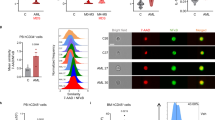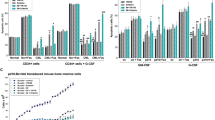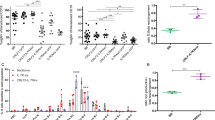Abstract
Over the past decade, there has been an exponential increase in our knowledge of how cytokines regulate signal transduction, cell cycle progression, differentiation and apoptosis. Research has focused on different biochemical and genetic aspects of these processes. Initially, cytokines were identified by clonogenic assays and purified by biochemical techniques. This soon led to the molecular cloning of the genes encoding the cytokines and their cognate receptors. Determining the structure and regulation of these genes in normal and malignant hematopoietic cells has furthered our understanding of neoplastic transformation. Furthermore, this has allowed the design of modified cytokines which are able to stimulate multiple receptors and be more effective in stimulating the repopulation of hematopoietic cells after myelosuppressive chemotherapy. The mechanisms by which cytokines transduce their regulatory signals have been evaluated by identifying the involvement of specific protein kinase cascades and their downstream transcription factor targets. The effects of cytokines on cell cycle regulatory molecules, which either promote or arrest cell cycle progression, have been more recently examined. In addition, the mechanisms by which cytokines regulate apoptotic proteins, which mediate survival vs death, are being elucidated. Identification and characterization of these complex, interconnected pathways has expanded our knowledge of leukemogenesis substantially. This information has the potential to guide the development of therapeutic drugs designed to target key intermediates in these pathways and effectively treat patients with leukemias and lymphomas. This review focuses on the current understanding of how hematopoietic cytokines such as IL-3, as well as its cognate receptor, are expressed and the mechanisms by which they transmit their growth regulatory signals. The effects of aberrant regulation of these molecules on signal transduction, cell cycle regulatory and apoptotic pathways in transformed hematopoietic cells are discussed. Finally, anti-neoplastic drugs that target crucial constituents in these pathways are evaluated.
This is a preview of subscription content, access via your institution
Access options
Subscribe to this journal
Receive 12 print issues and online access
$259.00 per year
only $21.58 per issue
Buy this article
- Purchase on Springer Link
- Instant access to full article PDF
Prices may be subject to local taxes which are calculated during checkout
Similar content being viewed by others
Author information
Authors and Affiliations
Rights and permissions
About this article
Cite this article
Blalock, W., Weinstein-Oppenheimer, C., Chang, F. et al. Signal transduction, cell cycle regulatory, and anti-apoptotic pathways regulated by IL-3 in hematopoietic cells: possible sites for intervention with anti-neoplastic drugs. Leukemia 13, 1109–1166 (1999). https://doi.org/10.1038/sj.leu.2401493
Received:
Accepted:
Published:
Issue Date:
DOI: https://doi.org/10.1038/sj.leu.2401493
Keywords
This article is cited by
-
A novel CD123-targeted therapeutic peptide loaded by micellar delivery system combats refractory acute myeloid leukemia
Journal of Hematology & Oncology (2021)
-
Impact of CD123 expression, analyzed by immunohistochemistry, on clinical outcomes in patients with acute myeloid leukemia
International Journal of Hematology (2019)
-
Bispecific Antibodies for the Treatment of Acute Myeloid Leukemia
Current Hematologic Malignancy Reports (2018)
-
De novo AML exhibits greater microenvironment dysregulation compared to AML with myelodysplasia-related changes
Scientific Reports (2017)
-
Retargeted adenoviruses for radiation-guided gene delivery
Cancer Gene Therapy (2016)



